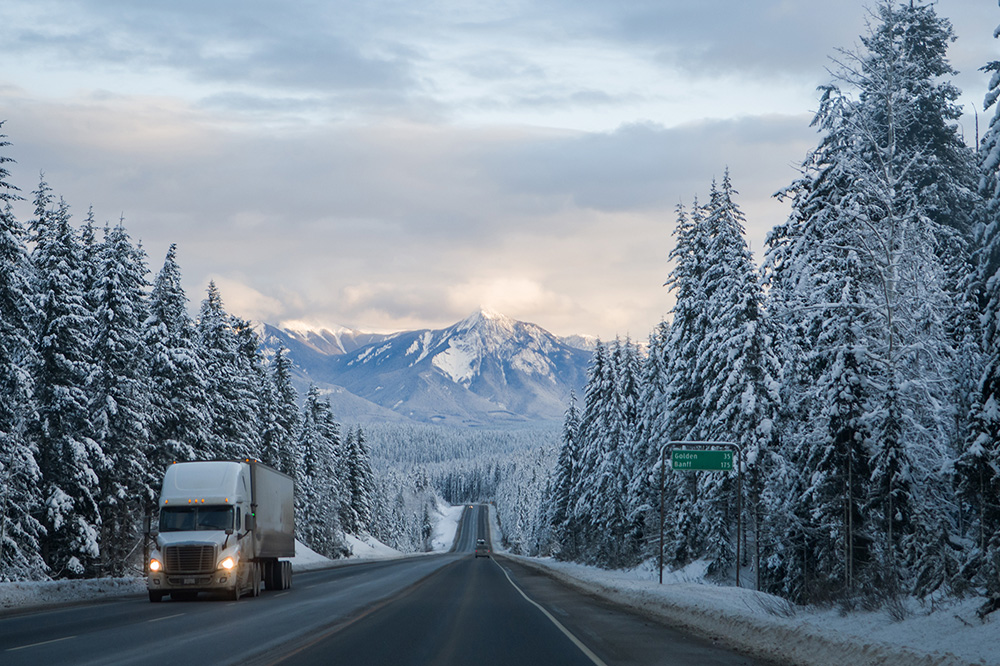Driving in slippery, snowy winter weather is no joke for any driver out on the road, but especially for truck drivers who are trucking in winter and driving trucks that are 20 to 30 times heavier than regular passenger vehicles on the road.
It’s a challenging, stressful task driving a semi-truck in hazardous winter weather conditions; no trucker wants to end up in an accident. which is why we’ve compiled a short list of tips for trucking in winter weather to help you keep control of your rig by maintaining traction on the road.
Tip 1. Go Your Own Way: Don’t Follow Other Truck’s Tracks.
If you’re driving up a hill or mountain covered in ice or snow a good rule of thumb is to not follow the tracks of other trucks up that hill. It may seem tempting to follow the paths of previous trucks who made it safely over the top, but chances are, the other trucks will have polished up the road with their tries as they travelled over the hill. You’ll have more traction forging your own path in the snow.
Tip 2. Every Bit Helps: Keep a Little to the Right Shoulder.
It’s likely there’s going to be gravel on that right shoulder of the road; that’ll help you a get little more of a grip to help maintain traction on slippery roads, especially hills. You’ll then travel up the right-hand side of your lane, hopefully with your right-hand wheels trekking on the gravel on the shoulder.
But be careful not to go too far to the right. Remain on the edge of the road while trying to find that bit of gravel on the shoulder. Sometimes that tiny bit of traction, will be enough to make a difference between a safe smooth ride or slipping off the road.
Trip 3. Stay Steady: Keep Shifting to a Minimum.
Don’t shift too often. When shifting gears and you let out the clutch, that there’s the potential to spin-out. You should always avoid spinning your wheels.
If you’re going uphill, don’t stop your truck on the hill. Stop at the top once the truck has leveled out. If you stop on the grade, your truck will likely lose traction and get stuck, making it extremely difficult to impossible to get your truck moving again.
Tip 4. Truck with Caution: Feather Your Brakes & Watch Your RPMs
You can use the jake brake. If you do though, it’s important you go down very slowly. You’ll risk running into serious trouble if you go down too quickly and then have to compensate for your speed, over correct or over brake, which could result in your truck sliding.
Braking should be gradual. You need to keep an eye on the mirrors — making sure the trailer isn’t starting to jackknife. If your truck’s trailer is empty, it’ll be lighter than the tractor, which could cause it to jackknife if the tractor receives too much brake pressure.
In addition to breaking correctly, make sure to keep an eye on your RPMs when you’re going up and down a slippery hill. Do what you can to keep your RPMs down. This will help prevent too much torque. Too much torque will increase your chances of spinning out and losing control of your semi-truck.
Tip 5. Plan Ahead: Do a Pre-Departure Inspection
If you know there’s a chance you could drive into snowy or icy conditions, make sure you plan ahead. Use N.O.A.A.’s National Weather Service website to check the weather forecast and see if there’s any active winter weather alerts you need to worry about.
Plus, the DOT’s Federal Highway Administration website can connect you to any state’s road cameras and traffic reports so you can check for road closures and potentially slippery spots.
Be sure to pack emergency supplies in case your get stuck stranded because of winter weather; check out our list of emergency essentials here.
Answer these simple pre-check inspection questions to go over before heading out on your next trip:
- Are brake lights and taillights visible and functioning correctly?
- Has the moisture has been drained from the air tanks?
- Are all of your mirrors in the right positions and clean so it’s easy to see?
- Are your windshield wipers in good shape? (not torn, broken, etc.)
- Have you topped up your wiper fluid to help keep the windshield clean?
- Are your truck’s defrost and heat working properly?
Trucking in winter weather can be hazardous so if you know in your gut you can’t get somewhere safely on time, call your dispatcher so they know what’s going on. That way, they can notify the receiver and make different arrangements for you.





